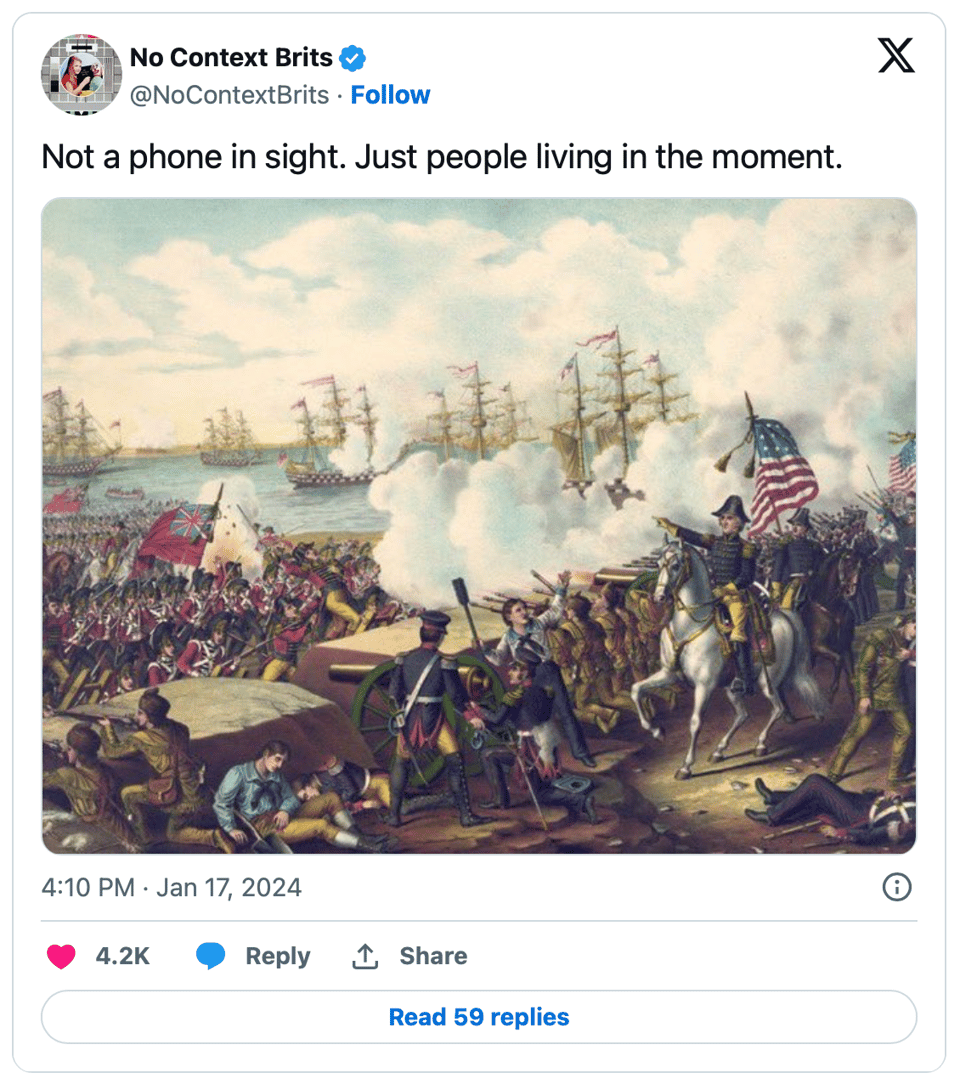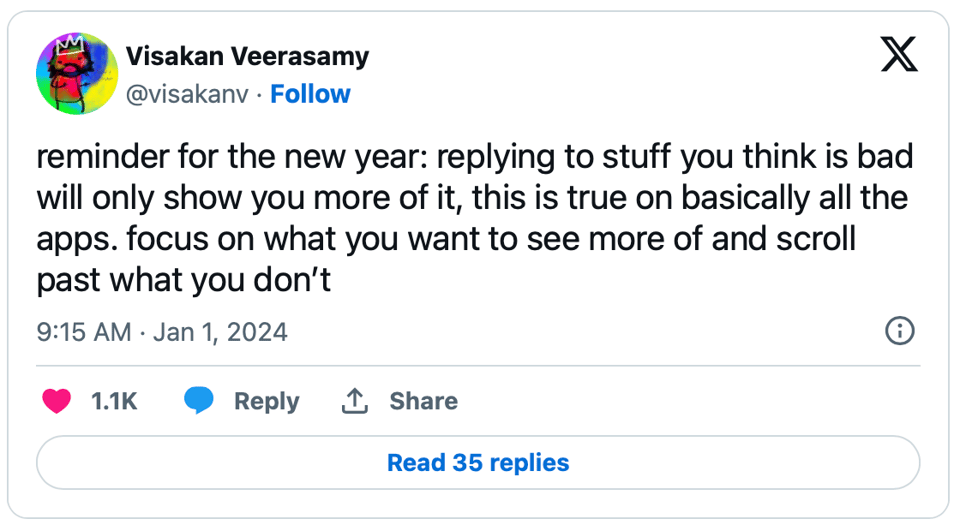Attention, please
Round two baby. A tad different, hopefully better, than numero uno thanks to thoughtful feedback from you, my real life friends.
Please keep sharing. Both thoughts on the stuff in here AND things to check out.
Steer my attention, please 😉
psv
I
"Attention is the beginning of devotion"
–Mary Oliver
II. Phil-osophizing
"Giving" your attention has a nice generous ring to it, accentuating the gift of expansive energy that it is. Seems fitting for an action that is the basis of connection. While "paying" attention to something sounds like a lot of work. And clearly it often is.
Both are active verbs that put you in the driver's seat. But you can just as easily become a passenger when your attention gets "grabbed" and "held". And I absolutely love the effortless state of getting lost in something—when it feels worthy.
In other words, I like to give my attention to things I deem to be good. And certainly do not want it hijacked by the bad.
But can you judge something when you're engrossed by it? Or do you need to step back from it to evaluate?
I can't even imagine the number of words written about the nature of attention and learning to steer it. I get why.
Letting its light shine seems necessary to be able to appreciate, understand, and do almost all the other good human stuff. It wants to flow freely, to wander after earnest curiosities.
At the same time, we're constantly forced into the house of mirrors of trying to pay attention to our attention.
Because the demand for it is red freaking hot staying aware of where it is going is critical. Fortunes are being made by building tools that can reliably grab on to it. So now we live a swipe away from the most outrage-ous, beautiful, weird things that 8 billion people are capable of.
So then what do we do? How do we do our curiosity justice and let it fly free without it getting trapped somewhere we don't like?
How can we skim so much while maintaining the ability to spot and appreciate less new and less crazy but more subtle and more worthy stuff? How do we decide what is worth our oh so finite attention? And how do we reliably give it?
I'm not sure. But clearly it's a delicate balance. It takes some kind of vigilance to intentionally steer attention. But then it's just as important to relax into the direction and ride the current—even when it gets choppy.
 III. Attention is a magnifying glass
III. Attention is a magnifying glass
"You might think that attention is a window between our brains and the world. You peer over here, you peer over there, like a submarine twisting its periscope around. And that’s mostly true, except the window is also a magnifying glass, enlarging whatever you see through it. Simply attending to something can make that thing seem more important than it really is."
– Adam Mastroianni
IV.
"Cultivating a garden is all about keeping some stuff out (bunnies, birds, bugs) and keeping other things in (water, fertilizer, sunlight). You can’t grow anything directly; you don’t make sunflowers taller by yanking on their stalks. All you can do is create the right environment and hope the seedlings reach for the sky.
Cultivating a human mind works the same way. You have to keep some stuff out (lies, noise, fear) and some stuff in (knowledge, experience, love). You can’t grow your mind directly; you don’t get smarter by yanking on your frontal lobe. All you can do is create the right environment and hope your brain-folds get deeper."
–Adam Mastroianni
V. Accelerating addictiveness
"What hard liquor, cigarettes, heroin, and crack have in common is that they're all more concentrated forms of less addictive predecessors. Most if not all the things we describe as addictive are. And the scary thing is, the process that created them is accelerating. And we wouldn't want to stop it."
"Technological progress means making things do more of what we want." It's good "when we want to want it" (more efficient energy production) and bad when we don't want to want it (tastier junk food).
As technological progress speeds up: "More things we like will mean more things we have to be careful about... and we'll be increasingly unable to rely on customs to protect us." One cited example: it took 100 years for smoking to be forced outside into specific areas.
So we need to be ok with being eccentric, to doing things differently from the norm: "As the world becomes more addictive, the two senses in which one can live a normal life will be driven ever further apart. One sense of "normal" is statistically normal: what everyone else does. The other is the sense we mean when we talk about the normal operating range of a piece of machinery: what works best."
"These two senses are already quite far apart. Already someone trying to live well would seem eccentrically abstemious in most of the US. That phenomenon is only going to become more pronounced."
–Paul Graham
This was from 2010. With quaint old Facebook as an example. Shout out to KH for giving me a print version of the PG archives.

VI. News is the new smoking
"The world is full of bad things and you should do something about them. The news is just a bad way of figuring out what the bad things are and what to do about them."
"I hope that news-reading goes the same way as smoking: a gross thing that our grandparents did because they didn’t know any better."
Life without news feels better:
"It feels like a war that used to be fought in my backyard is now being fought on Neptune instead."
Including for the people we interact with:
"I stopped importing my grand anxieties into conversations with friends, punishing them with my sullenness because I just read an article... as if nobody was allowed to feel good as long as bad things are happening... That’s how I came to see reading the news like smoking: harmful not just to the consumer, but to anyone nearby."
–Adam Mastroianni
VII
"Could I interest you in everything? All of the time?"
–Bo Burnham
VIII. 3 P's of depressive thinking
Pervasiveness, permanence, personalization. Characterized by reflexively responding to a "negative" event by: a) thinking it affects everything in one's life, b) expecting it to last, and c) attributing it to oneself over other possible explanations.
These were defined (ironically?) by Martin Seligman, a pioneer of the Positive Psychology movement, studying human flourishing instead of the classic approach of focusing solely on disorder.
Thanks to SV for giving me this during a tough spell in undergrad. If only I appreciated the insight sooner.

IX. The social media blast radius
"As you surface from an hour inadvertently frittered away on Facebook, you'd be forgiven for assuming that the damage, in terms of wasted time, was limited to that single misspent hour. But you'd be wrong. Because the attention economy is designed to prioritize whatever's most compelling-instead of whatever's most true, or most useful-it systematically distorts the picture of the world we carry in our heads at all times... If social media convinces you, for example, that violent crime is a far bigger problem in your city than it really is, you might find yourself walking the streets with unwarranted fear, staying home instead of venturing out, and avoiding interactions with strangers and voting for a demagogue with a tough-on-crime platform. If all you ever see of your ideological opponents online is their very worst behavior, you're liable to assume that even family members who differ from you politically must be similarly, irredeemably bad, making relationships with them hard to maintain. So it's not simply that our devices distract us from more important matters. It's that they change how we're defining "important matters" in the first place."
–Oliver Burkeman
X. Focus on what you want to see more of

XI
"Where your focus goes, your energy flows."
–Disclosure
XII. On recommending
Suggesting something might be worthy of attention is tricky business. Best case is that the way the recommendation framing guides you to enjoyment. Worst case is the opposite.
XIII. Music
Twice recently artists I already loved released songs that are contenders for my favourites that they've each made:
- Take What's Given by BADBADNOTGOOD(Spotify, YouTube)
- Weight of You by Ryan Harris(Spotify, YouTube)
JH suggested watching Parcels live, pointing to the skill it takes to play those rhythms and sing. And oh effing yeah:
- Lightenup (YouTube)
DH sent another great based on seeing the show and saying "what a character":
- KD and Lunch Meat by Golden Boy (Spotify)
Here's a Spotify playlist with these and others I've been listening to a lot lately.
XIV. Wow thank you for reading all that
These past couple weeks my mind kept wandering to the question "why on earth did I want to send out a newsletter?" Hence the theme of this edition. And its length (yikes). But I like the answer that eventually landed. So, lest I forget: It's an attempt to more intentionally steer my attention. To take the time to reflect, share, and hopefully instigate more conversations about things that are attention-worthy. Away from the just new, towards the good. From crafty strangers, towards ideas and recommendations from friends.
XV. Link list
I. Upstream by Mary Oliver (Book)
III. Underrated Ideas in Psychology by Adam Mastroianni (Article)
IV & VI. Reading News is the New Smoking by Adam Mastroianni (Article)
V. The Acceleration of Addictiveness by Paul Graham (Article)
VII. Welcome to the Internet by Bo Burnham (YouTube)
VIII. Learned Optimism by Martin Seligman (Book)
IX. Four Thousand Weeks by Oliver Burkeman (Book)
X. Tweet by Visakanv (X)
XI. ENERGY by Disclosure (Spotify)
Articles are grouped in Reader.
Add a comment: